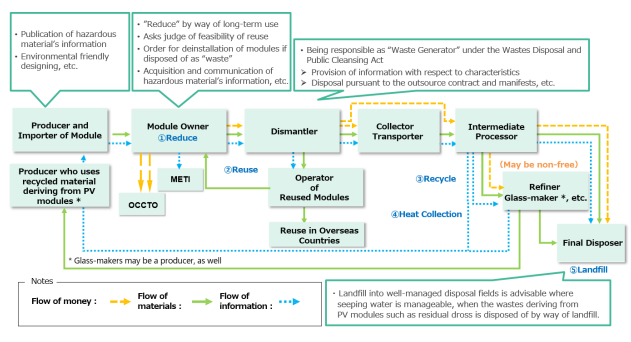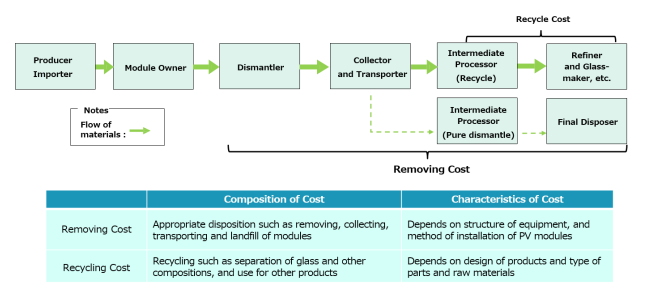1. Introduction
While technologies for decommissioning solar panels for which the period of use has elapsed, and the reuse of disassembled materials thereof, have been recently developed, current laws of Japan do not impose any obligations on PV operators to recycle or reuse decommissioned solar panels. As of now, decommissioned solar panels are supposed to be appropriately disposed of by a 'waste producer' in accordance with the existing Act on Waste Management and Public Cleaning.
In preparation for the expected mass disposals of decommissioned solar panels in the near future, a new recycling and reuse system of decommissioned solar panels is under discussion (the "New Recycling System") as led by the Japanese government, an outline of which is illustrated as follows.

Source: Page 1 of the "Reference Materials of the Recycling System of Solar Power Generation Equipment" published by METI and the Ministry of the Environment
In light of the situation above, discussions by a working group of the Ministry of Economy, Trade and Industry ("METI") and the Ministry of the Environment have been ongoing, and the group published a summary of their discussions entitled the "Recycling System of Solar Power Generation Equipment" (the "Roadmap Document") as of March 28, 2025.
2. Main Points of the Roadmap Document
The Roadmap Document mainly discusses three aspects of the New Recycling System of solar panels: materials, costs, and information. Specifically, the following issues are discussed.
2.1. "Materials"
From the perspective of materials in recycling, in the Roadmap Document it is proposed to establish a system to impose the obligation of delivery and collection for dismantling or recycling of solar panels on business operators. Specifically:
(i) The subject of the New Recycling System should include not only feed-in tariff ("FIT") and/ or feed-in premium ("FIP") equipment but also all other solar power generation equipment including non-FIT/FIP equipment with certain exceptions. To be specific, in the Roadmap Document it is stated that:
"For the purpose of promotion of recycling of decommissioned solar panels, in principle, all solar power generation equipment and solar panels should be the subject of the new recycling system to be introduced. However, some types of PV modules has no established
recycling technologies after the use thereof. By the same token, there may be a case where the recycling of such modules is difficult in terms of costs, whereas the volume of products for recycling would be very small. Accordingly, it would be necessary to set forth the appropriate scope of the new recycling system in line with the usage of solar panels as well as the development and actual usage of recycling technologies, in consideration of the type of installation and characteristics of solar panels.
Next-generation solar cells, which are expected to promote the introduction of solar power generation, are still at the stage of research and development and tests for commercialization. Therefore, whether such next-generation solar cells should be subject to the new recycling system shall be discussed based on the practical usage of such nextgeneration solar cells in the future and also on the development of recycling technologies.
The solar panels to be disposed of increasingly in the latter half of the 2030s will mainly consist of PV equipment and modules that are currently already installed. In addition, the number of non-FIT/FIP cases is expected to increase in the future as renewable energy sources become self-sufficient.
Accordingly, it would be appropriate to apply the new recycling system to not only FIT/FIP but also non-FIT/FIP equipment to be disposed as waste after the introduction of the system (including those already installed at the time of the commencement of the new system)."
(ii) In terms of the "quality of recycling," the Roadmap Document indicates the direction of the
New Recycling System based on the technical and economic nature of each solar panel component. In particular, it calls for an information management system for hazardous materials. Specifically, in the Roadmap Document it is stated as follows:
"While valuable metals used in frames and solar power cells have a higher source value as compared to glass, and such valuable materials are already being recycled, the valuable metal content has been decreasing, and in addition to such valuable metals, including silver and copper, the management of hazardous materials, such as lead, is also required. Glass is currently recycled by a wide range of technologies, such as downcycling into roadbed materials and advanced recycling into sheet glass.
On the other hand, regarding plastics used in solar backsheets and sealing materials (including EVA) and silicone used in solar cells, it is technically and economically implausible to implement material recycling or chemical recycling of such materials. Accordingly, currently thermal recycling is being used for such plastics and silicone materials."
2.2. Costs
In regards to costs, in the Roadmap Document there are discussions in respect of (i) costs for removing solar panels, and (ii) costs for recycling as follows:
(i) Costs for removing solar panels are to be borne by the owners of the solar modules. It is stated in the Roadmap Document that such costs shall be deposited with a third-party organization (i.e., the Organization for Cross-Regional Coordination of Transmission Operators ("OCCTO")) and then shall be received by the module owner if and when the solar panels are actually removed, so that such money is indeed used for removing modules; and
(ii) In terms of costs for recycling, module producers shall be responsible for such costs as module producers have the most information about the product. If a module producer is located overseas, it would be appropriate to make the relevant importer be responsible for the costs for recycling in order to ensure the effectiveness of the payment of costs for recycling. The Roadmap Document states as follows:
"In general, module producers have the most competent information on PV products. They are held responsible for recycling of products under the existing recycling act because such act is expected to lead to applicable and effective recycling and economic incentives to develop environmentally friendly designs that contribute to the reduction of recycling costs, such as easy dismantling, reduction of weight, and reduction in hazardous materials. However, given long-term use of solar panels, it is possible that a producer of dismantled solar panels may not be in business when the recycling actually occurs. In such case, a manufacturer cannot implement recycling by itself. In addition, it would also be difficult for foreign manufacturers with a large market share to collect and recycle their products.
Accordingly, regarding a manufacturer who cannot conduct recycling by itself, it would be appropriate to require such manufacturer to, instead of recycling itself, pay a certain amount of costs for recycling as calculated via multiplying the quantity of solar panels by a certain unit price.
If the PV module is manufactured by a foreign module producer, it would be applicable to require the importer to pay the recycling costs, as it would be difficult to ensure the payment by the foreign producer."
In addition, the Roadmap Document provides that it is appropriate to require the manufacturer or importer to pay the recycling costs to a third-party organization in order to provide recycling costs after confirming that the recycling has definitely been completed.
For the relationship between costs and materials described above, please see the flow chart below:

Source: Page 12 of the "Reference Materials of the Recycling System of Solar Power Generation Equipment" published by METI and the Ministry of the Environment
2.3. Information
The Roadmap Document further proposes the establishment of an (obligatory) registration system as follows for the parties involved (or shall be involved) in the New Recycling System:
(i) Registration of module producers as required for applicable disposal and recycling;
(ii) Registration of module owners, dismantling businesses, collection and delivery businesses, and recycling businesses as required for confirmation of the implementation status of recycling;
(iii) Registration of module owners as required for ensuring the dismantling of solar panels; and
(iv) Registration of module producers and owners as required for the management of costs of recycling.
With regard to the points for information above, in the Roadmap Document it is pointed out as a matter of information management as follows:
"With a view to efficient management of information regarding the recycling of PV modules, it would be appropriate to consolidate information to the government (and third-party organizations), while linking information of materials and information of costs. It is necessary to cooperate with the current information infrastructure and utilize digital technology in order to collect and exhaustively manage the information necessary to ensure applicable disposal and recycling, while reducing the burden of relevant business operators that possess such information. For example, it is useful to interlink the database among: (i) information of business plans of solar power generation equipment under the Act of Special Measures for Promotion of Renewable Energy, (ii) information on types of and materials contained in solar panels collected under the same Act, and (iii) information collected under the Act of Waste Management and Public Cleaning. It is also possible to receive information from local governments and other entities on solar power generation equipment, in particular from general power transmission service providers in case the information is of public interest."
3. Conclusion
In preparation for the mass disposal of solar panels in the future, the establishment of an appropriate recycling system is an urgent issue. We will continue to focus on the discussions on the implementation of the New Recycling System of solar panels as described above, in connection with the issues raised in the Roadmap Document.
The content of this article is intended to provide a general guide to the subject matter. Specialist advice should be sought about your specific circumstances.


